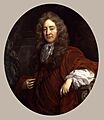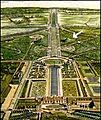Josiah Child facts for kids
Quick facts for kids
Sir Josiah Child
|
|
|---|---|
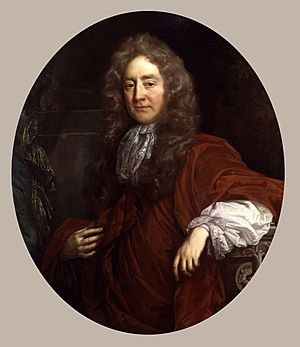
Portrait, oil on canvas attributed to John Riley (1646–1691), National Gallery Collections.
|
Sir Josiah Child (born around 1630 or 1631, died June 22, 1699) was an important English businessman, economist, and politician. He was a strong supporter of a trade system called mercantilism, which focused on a country's wealth. He also became the leader, or governor, of the powerful East India Company. He even led this company during a war with the Mughal Empire in India.
Contents
Early Life and Rise to Success
Josiah Child was born around 1630 or 1631. He was christened on February 27, 1631. His father, Richard Child, was a merchant in London.
After learning the family business, Josiah started his own company around age 25. He worked in Portsmouth, supplying food and other goods to the Navy during the time England was a Commonwealth. He also helped manage the Navy's money.
He became quite wealthy and bought many shares in the East India Company. In 1659, he was chosen as a Member of Parliament (MP) for Petersfield. An MP is someone elected to represent people in the country's government. Later, in 1673, he became an MP for Dartmouth.
Building a Grand Estate
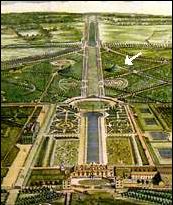
In 1673, Josiah Child bought a large estate called Wanstead Manor in Essex. He spent a lot of money making the gardens and grounds around the main house, Wanstead Hall, very grand.
A famous diarist named John Evelyn visited in 1683. He noted how much money Sir Josiah spent on planting trees and creating large fishponds. He mentioned that Child had become very rich from being a regular merchant's apprentice to managing the East India Company. Evelyn also noted that Child's daughter married the son of a Duke, bringing a large dowry (money given by the bride's family).
Another writer, Daniel Defoe, said that Child added "innumerable rows of trees, avenues and vistas" leading up to the house.
In 1678, King Charles II made Josiah Child a Baronet. This is a special title that passes down through the family, similar to a knight but hereditary. He was known as Sir Josiah Child, 1st Baronet of Wanstead. In 1685, he was elected MP for Ludlow. He also served as the High Sheriff of Essex in 1689, which was an important local government role.
Leading the East India Company
Josiah Child was a strong supporter of the East India Company. He argued that the company should have political power and control over its trade. His efforts got him noticed by the company's owners.
In 1677, he became a Director. He then rose to Deputy-Governor and finally became the Governor of the East India Company in 1681. As Governor, he managed the company almost like it was his own business.
He and Sir John Child (who was not related) are sometimes given credit for changing the company's approach from peaceful trade to using armed ships and soldiers. This change meant the company was ready to protect its trade with force.
War with Mughal India
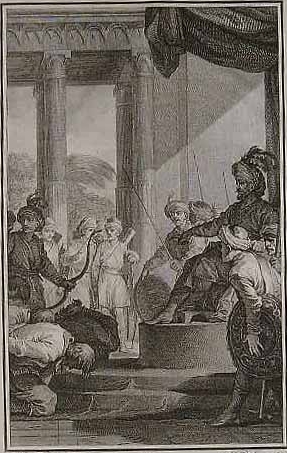
Sir Josiah Child led the East India Company into a war with Aurangzeb, the powerful Mughal Emperor of India. This war took place between 1688 and 1690.
The East India Company lost this war. However, Emperor Aurangzeb did not punish the company too harshly. After the company paid a large amount of money and promised to behave better, he allowed them to continue their trading rights.
Ideas on Economics
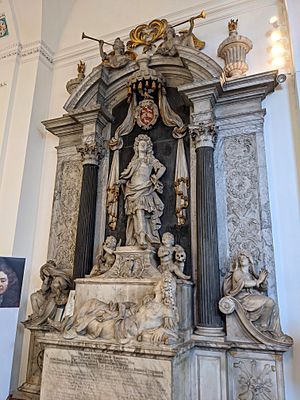
Sir Josiah Child wrote several books about economics, including Brief Observations concerning Trade and the Interest of Money (1668) and A New Discourse of Trade (1668 and 1690).
He believed that a country should try to sell more goods to other countries than it buys. This idea is part of what's called mercantilism. He also thought that having a low interest rate (the cost of borrowing money) was very important for a country to become rich, like the Dutch. He suggested that the government should control interest rates to keep them low.
Child also believed that having a large population was good for a country. He suggested ways to help and employ poor people. He also argued that England, as the "mother country," should have the only right to trade with its colonies.
While his economic ideas might seem a bit old-fashioned today, he was one of the most widely read writers on economics in the 1600s.
Family Life
Sir Josiah Child was married three times and had several children.
His first wife was Hannah Boate. They had one daughter who survived, Elizabeth. Elizabeth later married John Howland, and their daughter married the Duke of Bedford.
His second wife was Mary Atwood. They had Rebecca, Mary, and his son and heir, Josiah Child, who became the 2nd Baronet.
His third wife was Emma Willughby. They had one son, Richard Child, who later received the titles of Viscount Castlemaine and Earl Tylney.
Sir Josiah Child passed away on June 22, 1699, and was buried at Wanstead, Essex.
Images for kids
 | Percy Lavon Julian |
 | Katherine Johnson |
 | George Washington Carver |
 | Annie Easley |


